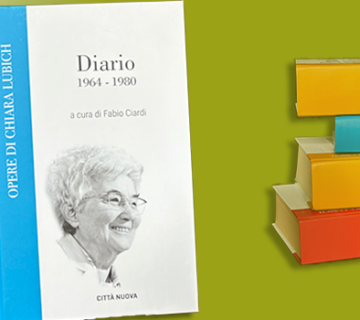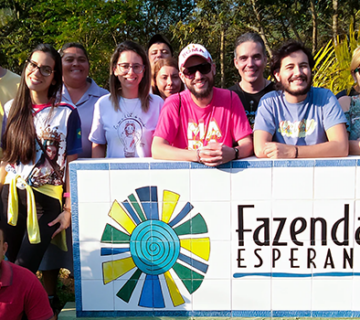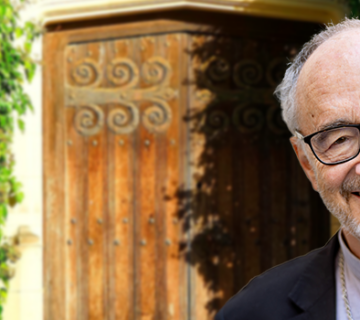 Ubuntu: “I am what I am because of who we all are.” This ancient concept found in many African cultures is the main focus of the Sharing With Africa Project. On April 27 – May 4, 2014, a hundred young people from 29 countries gathered in Nairobi, Kenya. Professor Justus Mbae, who is Dean of the Catholic University of East Africa, explained it during an open discussion: “Any situation regarding me personally comes after the community, because each person is part of that community; the community comes first. It is then through the relationship with those other people that compose the community, that I become a person.”
Ubuntu: “I am what I am because of who we all are.” This ancient concept found in many African cultures is the main focus of the Sharing With Africa Project. On April 27 – May 4, 2014, a hundred young people from 29 countries gathered in Nairobi, Kenya. Professor Justus Mbae, who is Dean of the Catholic University of East Africa, explained it during an open discussion: “Any situation regarding me personally comes after the community, because each person is part of that community; the community comes first. It is then through the relationship with those other people that compose the community, that I become a person.”
At Sharing With Africa, in the Focolare town in Kenya, the young people also shared their projects and stories as they try to respond to the challenge of their lands. Their creativity and commmitment were impressive, as they were able challenge even some public institutions.
Their mission statement is inspired by a speech by Chiara Lubich, who was the founder of the Focolare, in which she suggested some positive steps for changing a city: find some friends who support your project; focus on the least and the needy, help them in their need, and turn to God for what is lacking. In this way you will be laying the foundations of a new city, and your gaze will begin to expand across the world.
 Benedicto is a young nurse at a hospital in Iringa, Tanzania. Blood is a very precious commodity in his country. The lack of blood in the public blood banks results in many deaths. One day many women were sent home from the maternity ward because there were no more bags of blood in the hospital. Benedicto informed the young people from the Focolare with whom he had already been sharing a spiritual journey of care and concern for the needs of the least. The solution came right from the group. Why not invite the public to donate blood? “It’s true that in our country we don’t have much to share; at times the misery is overwhelming, but everyone has blood, it’s inside us.” A request letter was sent and in a few hours they had 22 bags of blood. The head of the blood bank confessed that he had never witnessed such generosity. That was 2010. In the last 4 years the project expanded to the point of becoming an official reference for all the institutions of public health in the country. In January the students at Ruaha University in Iringa and the Islamic Institute of Dar el Salaam, became voluntary donors.
Benedicto is a young nurse at a hospital in Iringa, Tanzania. Blood is a very precious commodity in his country. The lack of blood in the public blood banks results in many deaths. One day many women were sent home from the maternity ward because there were no more bags of blood in the hospital. Benedicto informed the young people from the Focolare with whom he had already been sharing a spiritual journey of care and concern for the needs of the least. The solution came right from the group. Why not invite the public to donate blood? “It’s true that in our country we don’t have much to share; at times the misery is overwhelming, but everyone has blood, it’s inside us.” A request letter was sent and in a few hours they had 22 bags of blood. The head of the blood bank confessed that he had never witnessed such generosity. That was 2010. In the last 4 years the project expanded to the point of becoming an official reference for all the institutions of public health in the country. In January the students at Ruaha University in Iringa and the Islamic Institute of Dar el Salaam, became voluntary donors.
 This is only one of the 800 examples of fraternity that have been recorded since 2012. They’re called “fragments of fraternity” to show that even though they are small, they are able to generate change. The others are found in the Atlas of Fraternity, which came out during this 17th edition of United World Week, which is the annual event that displays to international institutions projects that are making fraternty possible among people. The official opening was on May 1, 2014 in Nairobi, with twenty minutes of live streaming that linked people from around the world with Sharing With Africa.
This is only one of the 800 examples of fraternity that have been recorded since 2012. They’re called “fragments of fraternity” to show that even though they are small, they are able to generate change. The others are found in the Atlas of Fraternity, which came out during this 17th edition of United World Week, which is the annual event that displays to international institutions projects that are making fraternty possible among people. The official opening was on May 1, 2014 in Nairobi, with twenty minutes of live streaming that linked people from around the world with Sharing With Africa.
In her message of greeting, Focolare President, Maria Voce, congratulated those who took part in the project for their “stubborn courage” and efforts “immersed as they are in the complex affairs of the contemporary world.”She also referred to the ongoing work for the Atlas, mentioning that it is like working at a “massive work site, but that it’s the dream of God, as Chiara Lubich loved to describe it. And this is a also great garuntee. Universal Brotherhood is no Utopia: on the contrary! Even though it is a strenous journey, it is an ustoppable vision.” This year’s goal will be to engage national UNESCO delegations in officially recognising United World Week for the contribution it offers to the unity of the human family.
To the Young People for a United World: good work!


 Italiano
Italiano Español
Español Français
Français Português
Português



Estupendo projeto! Também procuro envolver-me cada vez mais convosco nele. Rezemos ao Espírito Santo para que o acelere contando com as nossas mentes, vontade e mãos.Coragem e contem comigo.